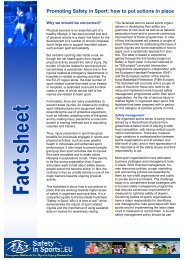Burden of Sport Injuries in the European Union - Safety in Sports
Burden of Sport Injuries in the European Union - Safety in Sports
Burden of Sport Injuries in the European Union - Safety in Sports
You also want an ePaper? Increase the reach of your titles
YUMPU automatically turns print PDFs into web optimized ePapers that Google loves.
19<br />
3 | February 2012<br />
Therefore, physical exercise is seen as a promis<strong>in</strong>g strategy for improv<strong>in</strong>g public<br />
health (Cavill et al. 2006). As sport <strong>in</strong> particular is associated with regular tra<strong>in</strong><strong>in</strong>g<br />
and targeted exertion, it plays an important role <strong>in</strong> <strong>the</strong> strategy <strong>of</strong> promot<strong>in</strong>g health<br />
enhanc<strong>in</strong>g physical activities. Also <strong>the</strong> “White Paper on <strong>Sport</strong>” (Commission <strong>of</strong> <strong>the</strong><br />
<strong>European</strong> Communities 2007) highlights that sport is a valuable tool for enhanc<strong>in</strong>g<br />
health, <strong>in</strong> particular for reduc<strong>in</strong>g <strong>the</strong> risk <strong>of</strong> overweight, cardio-vascular diseases,<br />
and diabetes. Diseases due to lack <strong>of</strong> activity are a severe burden on <strong>the</strong> health system<br />
and economy, as well as a source <strong>of</strong> dim<strong>in</strong>ishment <strong>of</strong> quality <strong>of</strong> life.<br />
The need for physical exercise as a condition for health is obviously already well<br />
known and understood by <strong>the</strong> general public. Zunft et al. (1999) report, that improv<strong>in</strong>g<br />
health is <strong>the</strong> most important reason for people over <strong>the</strong> age <strong>of</strong> 55 for do<strong>in</strong>g sport.<br />
There are various motives for active people for engag<strong>in</strong>g <strong>in</strong> sport or o<strong>the</strong>r physical<br />
activity as to improve fitness, to enhance personal appearance, to develop physical<br />
performance, to relax, to have fun, to be with friends and <strong>the</strong> enjoyment <strong>of</strong> do<strong>in</strong>g<br />
sport, but <strong>the</strong> lead<strong>in</strong>g motive is improv<strong>in</strong>g health. Zunft et al. report that 42% <strong>of</strong> <strong>the</strong><br />
participants <strong>of</strong> <strong>the</strong>ir survey reported that <strong>the</strong>ir ma<strong>in</strong> reason to do sport is to ma<strong>in</strong>ta<strong>in</strong><br />
good health, 30% to release tension and 30% to improve fitness. The recent Eurobarometer<br />
study on sport (2010) confirms <strong>the</strong>se f<strong>in</strong>d<strong>in</strong>gs: 61% <strong>of</strong> respondent mention<br />
improv<strong>in</strong>g health as motive. But <strong>the</strong>re are significant <strong>in</strong>terstate differences <strong>in</strong> <strong>the</strong> <strong>in</strong>tended<br />
personal benefits <strong>of</strong> sport. While 55% <strong>of</strong> <strong>the</strong> Spanish people do sport to ma<strong>in</strong>ta<strong>in</strong><br />
good health, only 21% <strong>of</strong> Portuguese people do so; 41% <strong>of</strong> Italian citizens get<br />
active for releas<strong>in</strong>g tension but only 16% <strong>of</strong> <strong>the</strong> Swedish citizens mention this as motive;<br />
36% <strong>of</strong> <strong>the</strong> Swedish people do sport to improve fitness and only 8 % <strong>of</strong> <strong>the</strong> Portuguese<br />
do so.<br />
Weight control is ano<strong>the</strong>r motive. In general, citizens <strong>of</strong> <strong>the</strong> <strong>European</strong> <strong>Union</strong> have <strong>the</strong><br />
op<strong>in</strong>ion that cont<strong>in</strong>uous sportive activity is good for prevent<strong>in</strong>g obesity. Goldberg<br />
and K<strong>in</strong>g (2007) ascerta<strong>in</strong>ed that physical activity is an important component <strong>of</strong> effective<br />
personal weight management. For achiev<strong>in</strong>g a measurable impact a person<br />
needs to be active at least for half an hour a day with at least modest <strong>in</strong>tensity. Although<br />
for only 13% <strong>of</strong> <strong>the</strong> active <strong>European</strong>s weight control is a lead<strong>in</strong>g motive (Zunft<br />
et al 1999), obese women report regularly to use sport for weight management.<br />
These motives reflect assumptions or knowledge about <strong>the</strong> general benefits <strong>of</strong> sport.<br />
On <strong>the</strong> o<strong>the</strong>r hand <strong>the</strong> factual participation <strong>of</strong> a person depends also on assumptions<br />
about how far <strong>the</strong> generally achievable benefits can be factually realized by this concrete<br />
person.



